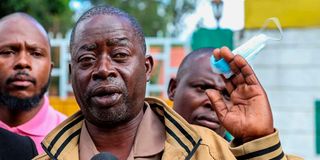
Inspector General of Police Douglas Kanja addresses journalists on June 9, 2025 at Central Police Station over the death of Albert Ojwang (inset) in police custody.
The mysterious death of Albert Ojwang—a Voi-based teacher and blogger—while in police custody has sparked nationwide outrage, prompting widespread condemnation from civil society, human rights groups and the public.
Mr Ojwang was arrested in Homa Bay over allegations of false publication following a complaint by Deputy Inspector General (DIG) of Police Eliud Lagat.
Inspector General (IG) of Police Douglas Kanja on Monday confirmed that his deputy in charge of the Kenya Police Service filed the complaint, claiming his name had been tarnished by online posts.
“Yes, there was a complaint lodged by the DIG about his name being tarnished. It is on that basis that investigations were carried out because he also has a right to be protected by the law,” said IG Kanja during a visit to Central Police Station in Nairobi.
However, the IG assured that any officer found culpable in Ojwang’s death will face the full force of the law.
Despite these assurances, public anger surged with protestors taking to the streets in Nairobi. Civil society organisations, activists And professional bodies have condemned what they term as a blatant abuse of authority.
But unsettling was that Independent Policing and Oversight Authority (IPOA) Chairperson Ahmed Issack Hassan stood alongside the very officers under suspicion. Mr Hassan, however, pledged transparency in the investigations.
“I want to assure the public and Ojwang’s family that we will get to the bottom of this matter and justice will be served,” he said, adding that IPOA officers had already visited the scene.
In Nairobi, the City Mortuary roundabout became the epicentre of grief and protest as demonstrators carried placards bearing the hashtag #JusticeForOjwang.

Activists protest outside Nairobi Funeral Home on June 9, demanding justice for murdered blogger Albert Ojwang.
Just meters away, the blogger’s body lay at the mortuary, awaiting a post-mortem.
Chants of “No justice, no peace!” rang out momentarily halting traffic as emotions ran high with police, caught between maintaining order and facing public scrutiny, watched tensely.
The protests were echoed online and in statements from various human rights organisations including the Law Society of Kenya (LSK) which condemned Mr Ojwang’s arrest, detention and death saying all events leading to the deceased’s demise “wreak of illegality, malice and abuse of authority”.
LSK President Faith Odhiambo questioned why Mr Ojwang was transferred to Nairobi, far from the jurisdiction where the alleged offence occurred.
“Unless a court transfers a case, every offence must be tried by a court within the jurisdiction in which it was committed,” Ms Odhiambo stated.
The society also called on Mr Lagat to recuse himself from any involvement in the investigations, noting that his continued presence could compromise their integrity.
The International Commission of Jurists (ICJ) - Kenya called Mr Ojwang’s death a “travesty,” saying that from the moment of arrest, the state assumed full responsibility for his safety and well-being.
“The Constitution guarantees inviolability of human dignity and freedom from inhuman treatment,” ICJ-Kenya Executive Director Protas Saende said.
Mr Saende urged the government to operationalise the Coroner’s Service Act, passed in 2017, which mandates independent investigations into deaths occurring in suspicious circumstances.
“Law enforcement must not serve as executioners. We must end the cycle of abuse with real consequences,” he said.
The International Justice Mission (IJM) - Kenya praised the swift interdiction of the officers on duty during Mr Ojwang’s detention and urged IPOA to conduct a transparent investigation.
“We remain committed to uncovering the truth and ensuring that justice is served,” said Vincent Chahale, IJM-Kenya Country Director.
Amnesty International - Kenya also weighed in calling on IPOA and the Kenya National Commission on Human Rights to conduct independent and thorough probes.
“The findings of these investigations must be made public and any officers found responsible must be held fully accountable in accordance with the law,” read part of its statement.
The Nation has learned that Mr Ojwang’s death has sent shockwaves through the police leadership with IG Kanja said to be furious over the incident.
“The IG was breathing fire this morning and vowed that by the end of this matter, all officers in the country will have learnt a lesson,” a senior officer revealed.
Police initially claimed that Mr Ojwang had hit his head against a wall and was found unconscious in a cell before dying en route to Mbagathi Hospital.
But this version was quickly questioned, especially after the announcement that multiple officers had been interdicted pending a probe.

Meshack Ojwang, father of Albert Ojwang, speaks to journalists outside Nairobi Funeral Home on June 8, 2025.
Ojwang’s death spotlighted allegations of police brutality and has reignited debate about accountability within the National Police Service.
The timing is particularly damning for the police who are already under scrutiny over a recent spate of human rights violations.
Mr Ojwang leaves behind a grieving widow and a five-month-old child.







